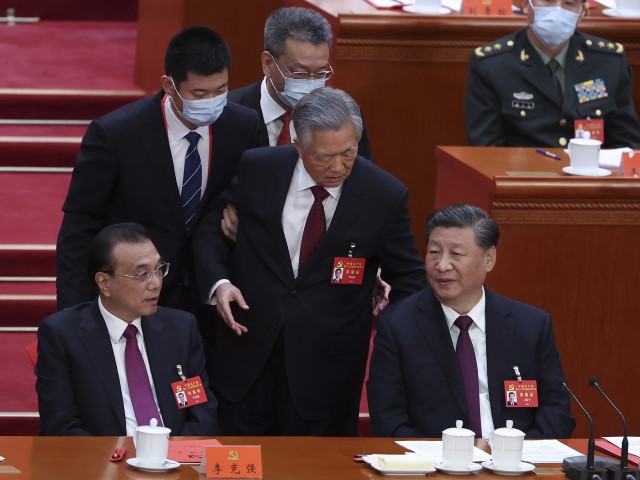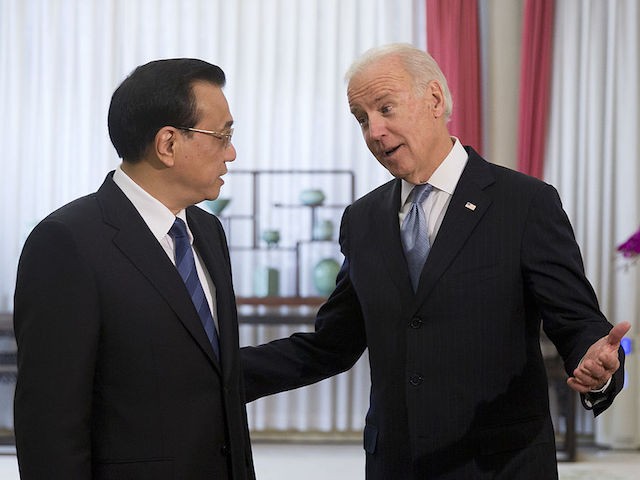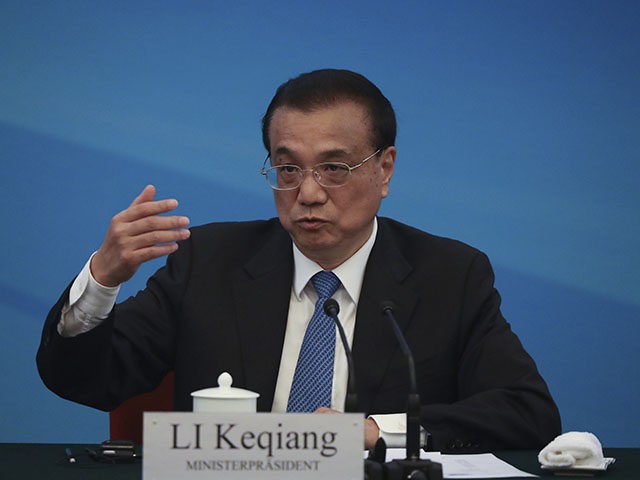The sudden death of former Chinese Premier Li Keqiang – who only lost his position as second-in-command to dictator Xi Jinping in March and cultivated an image as a “rival” to the totalitarian autocrat – follows a growing list of incidents in which China’s most powerful die, suddenly disappear, or are abruptly dismissed from their jobs.
The Chinese government currently has no defense minister, a top military position, after announcing the dismissal this week of former titleholder Li Shangfu. Li had been missing for two months before a curt and sudden announcement appeared in Chinese social media outlets stating he no longer held the job, but offering no explanation for why or who would replace him.
The same reports revealed that Qin Gang, the former foreign minister, had lost his last remaining title of “state councilor.” Qin disappeared in June before Chinese media issued a similar, short missive confirming that Qin had been removed from office.
Li’s disappearance occurred amid what the Nikkei Asian Review described as a “great military purge” this month, following declarations by Beijing of a similar campaign to eradicate allegedly “corrupt” officials in the public health sector and a bizarre series of events at the 2022 Communist Party Congress in which Xi Jinping’s thugs dragged then-79-year-old former President Hu Jintao out of the congressional chamber on camera. Hu has since disappeared from the public eye, notably missing the funeral of former President Jiang Zemin in December.
Given his advanced age – Jiang was 96 when he died – his passing did not raise any suspicions of foul play.
Li Keqiang was 68 and had lost the title of premier in March. According to China’s state-run Global Times propaganda outlet, Li “died of a sudden heart attack … after all-out rescue efforts failed.”

(L-R) Chinese Premier Li Keqiang, former President Hu Jintao and President Xi Jinping attend the closing ceremony of the 20th National Congress of the Communist Party of China (CPC) at the Great Hall of the People on October 22, 2022 in Beijing, China. (Lintao Zhang/Getty)
“Li was extolled as an excellent CPC [Communist Party] member, a time-tested and loyal communist soldier and an outstanding proletarian revolutionist, statesman and leader of the Party and the state,” the state newspaper added.
Nikkei observed on Friday that China’s major propaganda outlets did not turn their pages black and white, as they traditionally do following the death of a senior Communist Party member (the newspapers remained black and white for days after Jiang’s expected death). Li appeared to have lost top-story status to visiting California Governor Gavin Newsom, who met with Xi this week and promised California, under his Democrat administration, would serve as a “long-term, stable, and strong partner” to the communists.
Chinese internet censors also appeared to be monitoring, though not yet censoring, the nation’s major social media sites, Weibo and WeChat. Some reports described the ability to comment on Li on the Chinese internet on Friday as “severely restricted.” Li was a top trending topic on Weibo and Douyin, China’s regulated version of Tiktok, as of Friday. Some commented lamenting covertly that Li did not have more power while he was premier. Others reportedly used song lyrics to lament that Li, and not Xi, was the one who died.
For much of the early years of Xi’s tenure as dictator of China, which began in 2013, Li developed a reputation as a potential rival or successor. Given the secretive nature of the Chinese Communist Party, Li never challenged Xi publicly, but experts and observers found a series of bizarre public appearances in 2016 as an indication of a relationship “seriously soured.”

File/U.S. Vice President Joe Biden (R), chats with Chinese Premier Li Keqiang before heading to their meeting at the Zhongnanhai diplomatic compound on December 5, 2013 in Beijing, China. (Andy Wong-Pool/Getty Images)
Li clung to the little power Xi afforded his office for another six years, but was abruptly sidelined in the 2022 Communist Party Congress, where again experts reasoned that Xi had removed him because of his status as a “prospective rival” and his preference for “market-oriented reforms” at a time in which Xi had launched a parallel purge of the business sector, taking out another potential rival, Alibaba founder Jack Ma. Ma vanished in late 2021 after publicly criticizing Xi and has since taken up a teaching job in Japan.
The circumstances surrounding the disappearance of a series of top officials and powerful businessmen like Ma vary significantly, but the number of such incidents appears to be increasing since the October 2022 Communist Party Congress. Shortly before that event, Xi purged a deputy public security minister, Sun Lijun, sentencing him to life in prison on alleged corruption charges. The embarrassing Hu Jintao incident occurred at the Congress itself and yielded a bizarre explanation in state media.
The government outlet Xinhua reported that Hu “insisted on attending the closing session” of the Congress despite “not feeling well,” but was “much better” after being manhandled on camera by regime security.
Hu preceding Xi as president of China. His tenure was reportedly marked by a lax discipline culture that allowed corruption to spread, and rumors swirled following his purge that he had planned to object to Xi’s prolonged stay in power – though the rumors were never substantiated by any direct evidence from Hu.
The disappearances of former Foreign Minister Qin and Defense Minister Li presented slightly differing scenarios, as both were relatively young rising stars hand-picked to take over their offices by Xi – supposed loyalists who had a long career ahead of themselves. The Chinese government first described Qin’s disappearance in June as health-related, but later announced he had simply lost his position. Weibo posts speculated that Qin had engaged in an extramarital affair with a journalist and fathered an American-born child – and Chinese censors failed to erase those comments.
Similarly, Chinese officials claimed in September that Li had suffered from unspecified health problems before firing him. Unlike Qin, Li was not accused of personal improprieties, but rumors have swirled accusing Li of corruption while in charge of procuring equipment for the Chinese military. Beijing has yet to announce any corruption charges against Li at press time.
Follow Frances Martel on Facebook and Twitter.

COMMENTS
Please let us know if you're having issues with commenting.